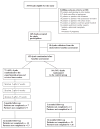Dyads affected by chronic heart failure: a randomized study evaluating effects of education and psychosocial support to patients with heart failure and their partners
- PMID: 22555264
- PMCID: PMC3381875
- DOI: 10.1016/j.cardfail.2012.01.014
Dyads affected by chronic heart failure: a randomized study evaluating effects of education and psychosocial support to patients with heart failure and their partners
Abstract
Background: Chronic heart failure (CHF) causes great suffering for both patients and their partners. The aim of this study was to evaluate the effects of an integrated dyad care program with education and psychosocial support to patients with CHF and their partners during a postdischarge period after acute deterioration of CHF.
Methods: One hundred fifty-five patient-caregiver dyads were randomized to usual care (n = 71) or a psychoeducation intervention (n = 84) delivered in 3 modules through nurse-led face-to-face counseling, computer-based education, and other written teaching materials to assist dyads to develop problem-solving skills. Follow-up assessments were completed after 3 and 12 months to assess perceived control, perceived health, depressive symptoms, self-care, and caregiver burden.
Results: Baseline sociodemographic and clinical characteristics of dyads in the experimental and control groups were similar at baseline. Significant differences were observed in patients' perceived control over the cardiac condition after 3 (P < .05) but not after 12 months, and no effect was seen for the caregivers.No group differences were observed over time in dyads' health-related quality of life and depressive symptoms, patients' self-care behaviors, and partners' experiences of caregiver burden.
Conclusions: Integrated dyad care focusing on skill-building and problem-solving education and psychosocial support was effective in initially enhancing patients' levels of perceived control. More frequent professional contact and ongoing skills training may be necessary to have a higher impact on dyad outcomes and warrants further research.
Copyright © 2012 Elsevier Inc. All rights reserved.
Figures
References
-
- Dickstein K, Cohen-Solal A, Filippatos G, McMurray JJ, Ponikowski P, Poole-Wilson PA, Strömberg A, et al. ESC guidelines for the diagnosis and treatment of acute and chronic heart failure 2008: the Task Force for the Diagnosis and Treatment of Acute and Chronic Heart Failure 2008 of the European Society of Cardiology [ESC]. Developed in collaboration with the Heart Failure Association of the ESC (HFA) and endorsed by the European Society of Intensive Care Medicine (ESICM) Eur J Heart Fail. 2008;10:933–89. - PubMed
-
- Lloyd-Jones D, Adams R, Carnethon M, De Simone G, Ferguson B, Flegal K, et al. AHA heart disease and stroke statistics 2009. Circulation. 2009;119:e21–181. - PubMed
-
- Rohrbaugh MJ, Shoham V, Coyne JC. Effect of marital quality on eight-year survival of patients with heart failure. Am J Cardiol. 2006;98:1069–72. - PubMed
-
- Luttik ML, Jaarsma T, Tijssen JG, van Veldhuisen DJ, Sanderman R. The objective burden in partners of heart failure patients; development and initial validation of the Dutch Objective Burden Inventory. Eur J Cardiovasc Nurs. 2008;7:3–9. - PubMed
-
- Lamura G, Mnich E, Nolan M, Wojszel B, Krevers B, Mestheneos L, Döhner H EUROFAMCARE Group. Family carers’ experiences using support services in Europe: empirical evidence from the EUROFAMCARE study. Gerontologist. 2008;48:752–71. - PubMed


